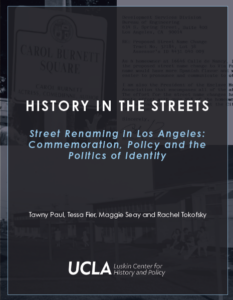History in the Streets: Street Renaming in Los Angeles: Commemoration, Policy and the Politics of Identity
 Whether it be city planning or school curricula, tension over how history is represented, remembered and taught has gripped the American social and political landscape over the past several years. The 2020 Black Lives Matter uprisings brought renewed and critical attention to public commemoration, particularly the abundance of statues, memorials and place-names dedicated to the legacies of the Civil War, and how these offer one-sided historical narratives. Commemoration has implications for civic identity and belonging in urban neighborhoods. Discussions over whether a statue should be removed or remain intact are often lightly concealed debates over whose history and whose identity should be represented in the physical fabric of the city. The histories that we tell affirm and entrench power relations. In order to address issues of memory, power and identity in the urban landscape, this report focuses on street names as forms of commemoration, using Los Angeles as a case study.
Whether it be city planning or school curricula, tension over how history is represented, remembered and taught has gripped the American social and political landscape over the past several years. The 2020 Black Lives Matter uprisings brought renewed and critical attention to public commemoration, particularly the abundance of statues, memorials and place-names dedicated to the legacies of the Civil War, and how these offer one-sided historical narratives. Commemoration has implications for civic identity and belonging in urban neighborhoods. Discussions over whether a statue should be removed or remain intact are often lightly concealed debates over whose history and whose identity should be represented in the physical fabric of the city. The histories that we tell affirm and entrench power relations. In order to address issues of memory, power and identity in the urban landscape, this report focuses on street names as forms of commemoration, using Los Angeles as a case study.
This important research was led by LCHP Researcher and Directory of the Public History Initiative Tawny Paul, who worked with UCLA graduate students Tessa Fier, Maggie Seay, and Rachel Tokofsky.
Read the full report [here].



